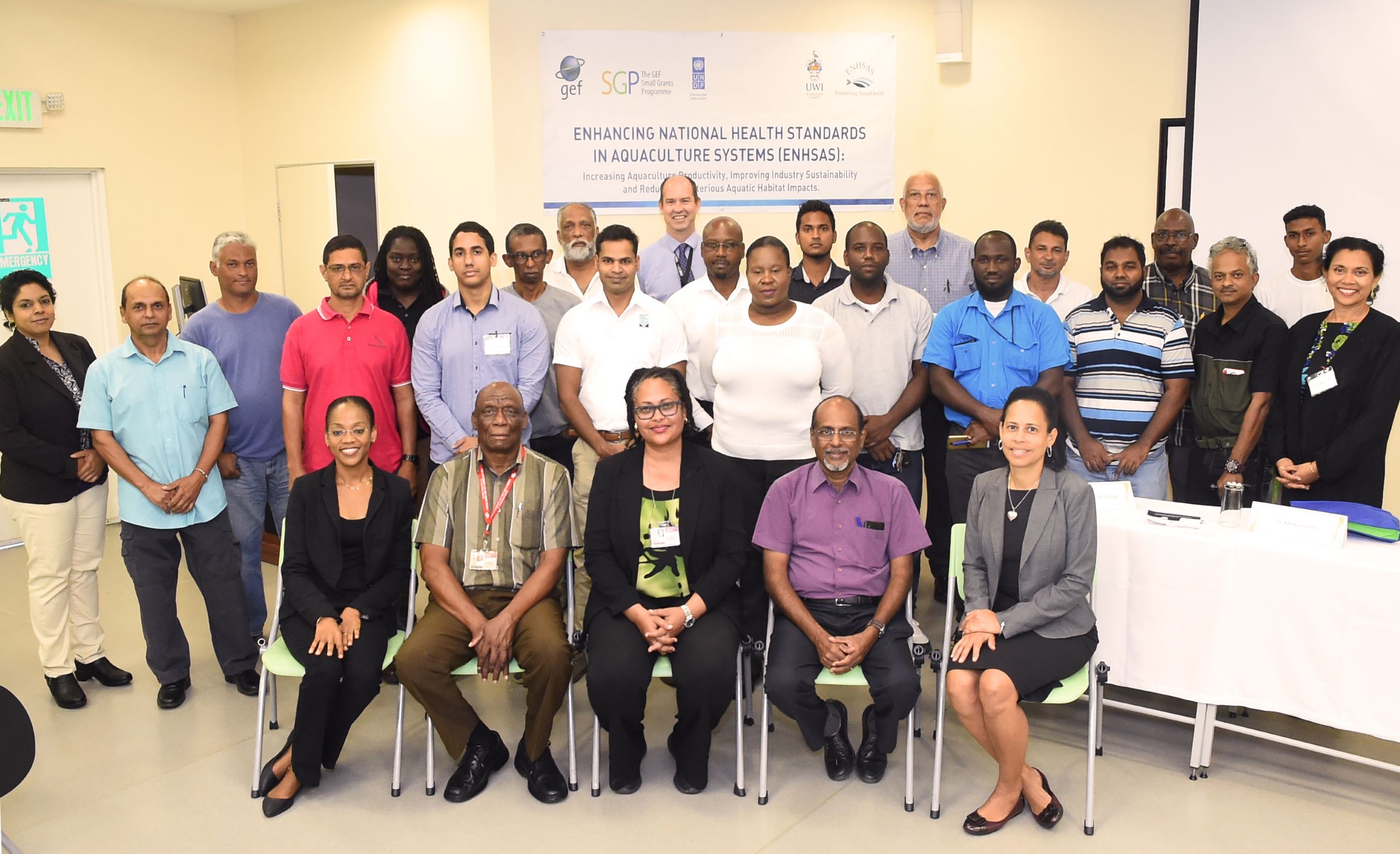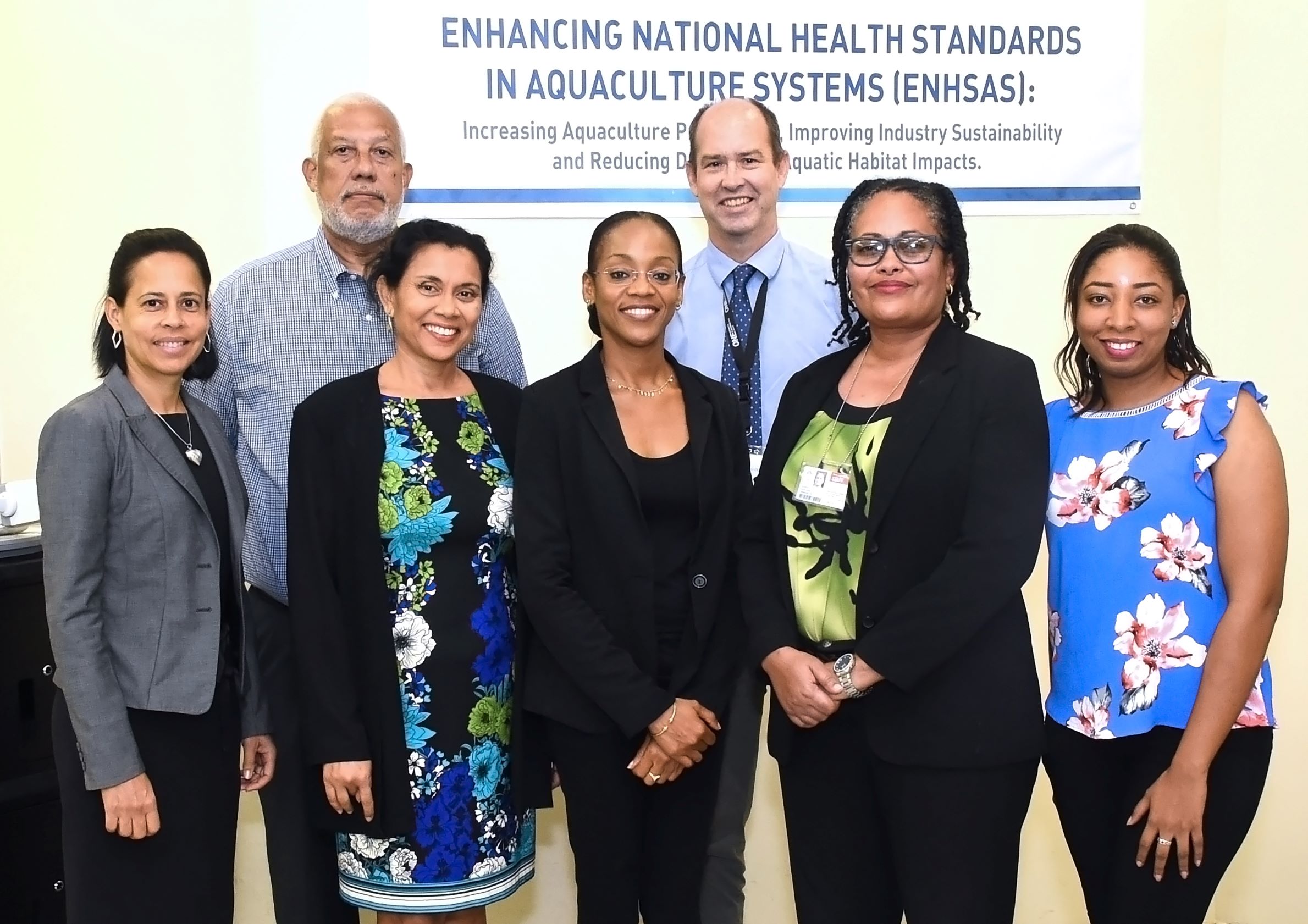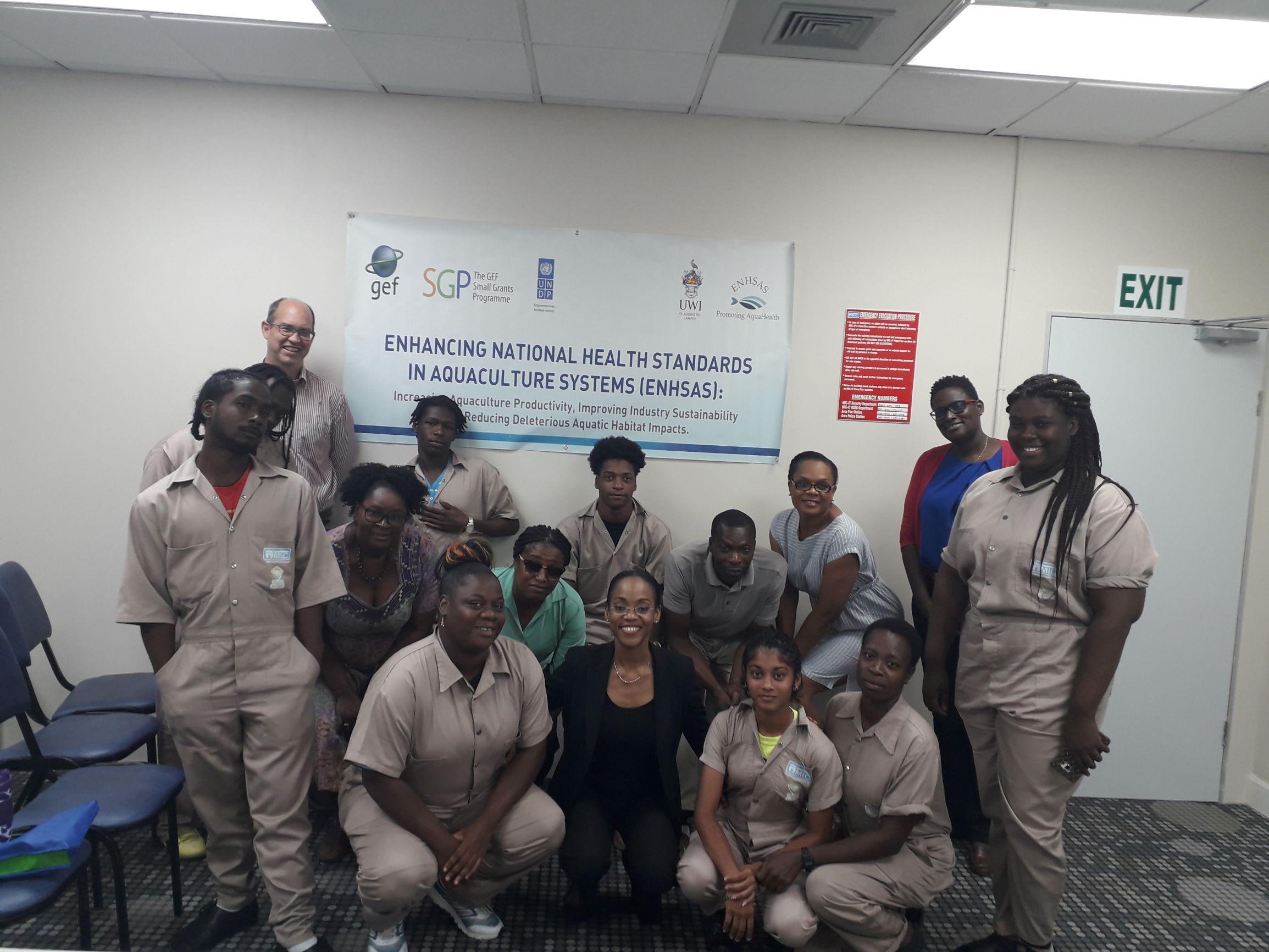News Releases
The UWI and GEF SGP: Working Towards a More Sustainable T&T Aquaculture Sector
For Release Upon Receipt - November 23, 2020
St. Augustine
Expanded diagnostic laboratory services and public education videos launched
Aquaculture, the farming of aquatic animals, is big business. The United Nation’s Food and Agriculture Organisation (FAO) estimates its global value at over US$263.6 billion. Recognising aquaculture’s great potential, the Aquatic Animal Health (AAH) Unit at The UWI St Augustine’s School of Veterinary Medicine (UWI SVM) embarked on a two-year project to strengthen the sector.
The project, titled “Enhancing National Health Standards in Aquatic Systems (ENHSAS)”, has been engaging with aquaculture producers and hobbyists since 2018 on increasing productivity, improving sustainability and protecting human, animal and environmental health. ENHSAS will be completed in December 2020.
“We developed this project to direct grant funding to strengthen the local aquaculture sector,” says Dr. Carla Phillips Savage, Lecturer and Coordinator at the AAH Unit.
Phillips Savage, alongside Indira Jagassar, Manager of Business Development in the St. Augustine Centre for Innovation and Entrepreneurship (STACIE), established ENHSAS with the financial support of the United Nations Development Programme’s (UNDP’s) Global Environment Facility Small Grants Programme (GEF SGP).
ENHSAS worked to improve local aquaculture by increasing the awareness on animal, human and environmental health monitoring, and disease management. This is directly in keeping with the UN Global Sustainable Development Goals (SDG). SDG 14 seeks to "conserve and sustainably use the oceans, seas and marine resources". It notes that "fisheries and aquaculture offer ample opportunities to reduce hunger and improve nutrition, alleviate poverty, generate economic growth and ensure better use of natural resources", while recognising that “unmanaged aquaculture expansion can cause pollution and rising levels of carbon dioxide in the atmosphere that contribute to ocean acidification".
Further, initiatives of the Food and Agriculture Organisation (FAO) focus on "promoting good governance, participatory decision-making processes and best practices in fisheries". The FAO's Blue Growth Initiative aims at "harmonising the environmental, social and economic aspects of living aquatic resources to ensure equitable benefits for communities". The ENHSAS project aligns with each of these UN goals to support industry sustainability while mitigating threats.
The project team which was led by Phillips Savage and Jagassar, also included UWI-SVM veterinary virologist Chris Oura, and aquaculture production specialist Paul Gabbadon. Through the project, aquaculturists discussed invasive species, diseases of aquatic animals, threats to local biodiversity and the interconnectedness of health, aquatic animal health and environmental health; collectively referred to as “One Health”. The project received the full support of sector players including the Ministry of Agriculture, Land and Fisheries, the Institute of Marine Affairs (IMA) and the Environmental Management Authority (EMA).
As part of the initiative, several knowledge sharing, outreach and awareness building activities were held from September 2018 to November 2019. These included a stakeholder dialogue session, to gain an appreciation of the challenges faced by local aquaculture producers and hobbyists; a three-day aquaculture farmers’ training workshop in which 25 aquaculture industry stakeholders were trained in Aquatic Animal Health best practices, and two one-day educational outreach symposia conducted at the MIC Institute of Technology in Canaan, Tobago, in which 28 youths and five of their instructors were sensitised to aquatic One Health issues pertaining to the aquaculture industry and industry best practices.
A major deliverable was the development of a series of short public education videos which illustrate best practices in managing fish as pets and in aquaculture, available on the ENHSAS Project YouTube channel. These videos appeal to young men, young women and the general public at large, encouraging them to adopt behaviours that preserve aquatic ecosystem health and conserve freshwater and marine habitats, whilst giving great advice to those wishing to engage in aquaculture as a hobby or livelihood. The videos focus on topics like Proper Disposal of Fish, Best Practices in Aquaculture and Proper Disposal of Wastewater, among others.
The UWI-SVM also expanded their Aquatic Animal Health diagnostic laboratory offerings, now with the capacity to conduct tests to definitively identify specific fish pathogens of economic importance. These services are available to the general public and it is hoped that they can bring relief to aquaculturists across the country, especially those who have experienced fish loss due to diseases.
Through outreach initiatives, videos, and laboratory services, The UWI-SVM hopes to continue to support and promote best-practices for the prevention of disease entry, early disease recognition and proper chemical and drug usage and disposal, in order to ensure the sustainability of ornamental and food fish aquaculture in Trinidad and Tobago. The project is in its final phases and is scheduled to be completed this year.
END
NOTES TO EDITOR
Photo Captions:
Photo 1- Dr. Carla Phillips Savage, Lecturer and Coordinator of The UWI-SVM Aquatic Animal Health Unit delivers a presentation during the Aquaculture Farmers' Workshop - Nov 22, 2018 (Photo Credit: Mr. Dexter Superville, Centre for Medical Sciences Education)

Photo 2 - Aquaculture Farmers Training Workshop Attendees- Nov 21-23, 2018 (Photo Credit: Mr. Dexter Superville, Centre for Medical Sciences Education)

Photo 3 - Director UWI-SVM with ENHSAS Project Team- Nov 21, 2018; Front Row: Ms. Melanie Richards (UNDP GEF-SGP Representative); Mrs. Indira Jagassar (Manager of Business Development), Dr. Carla Phillips Savage (Project Lead; Aquatic Animal Health and One Health practitioner and educator); Dr. Karla Georges (Director, UWI-SVM); Ms. Janneil Merritt (ENHSAS Project Assistant); Back Row: Mr. Paul Gabbadon (Aquaculture Production Specialist); Professor Chris Oura (Veterinary Virologist and One Health educator). Photo Credit: Mr. Dexter Superville, Centre for Medical Sciences Education (Photo Credit: Mr. Dexter Superville, Centre for Medical Sciences Education)

Photo 4 - Dr. Carla Phillips Savage (Front row centre) and Professor Chris Oura (Back row far left) with MIC Student Trainees and MIC Teachers- ENHSAS Educational Outreach Symposium #1- June 12, 2019 (Photo Credit: ENHSAS Project)
About GEF SGP
The GEF Small Grants Programme provides financial and technical support to non-profit organisations to help conserve and restore the environment, enhancing people's well-being and livelihoods and building community resilience to withstand disaster. Launched in 1992, the year of the Rio Earth Summit, the GEF SGP is implemented by UNDP on behalf of the GEF partnership. The Program is specifically designed to mobilize bottom-up actions by empowering local civil society organizations, and poor and vulnerable communities, including women and Indigenous Peoples. It believes that community-driven and civil society-led initiatives can generate environmental benefits, while supporting sustainable livelihoods, gender equality and civil society empowerment. The programme supports projects dealing with Biodiversity; Climate Change Mitigation and Adaptation; Land Degradation and Sustainable Forest Management; and International Waters and Chemicals.
For more information please contact:
FUNDING AGENCY
Magella Moreau, Communications Consultant
United Nations Development Programme
Mobile: +1 868 788-5975
Email: magella.moreau@undp.org
OR
Dr. Sharda Mahabir
National Coordinator, GEF SGP UNDP
Email: sharda.mahabir@undp.org
ENHSAS PROJECT
Dr. Carla Phillips Savage
Coordinator, Aquatic Animal Health Unit and Diagnostic Laboratory
The University of the West Indies, School of Veterinary Medicine
Email: Carla.Phillips@sta.uwi.edu
OR
Mrs. Indira Jagassar
Manager - Business Development
St. Augustine Centre for Innovation and Entrepreneurship
The University of the West Indies
Email: indira.jagassar@sta.uwi.edu
AQUACULTURE PRODUCTION SUPPORT
Aquaculture Unit
Ministry of Agriculture, Land and Fisheries
Phone: (868) 462-4348
Fisheries and Aquaculture Research Programme
Institute of Marine Affairs
Phone: (868) 634-4291/4292/4293/4294
About The UWI
For more than 70 years The University of the West Indies (The UWI) has provided service and leadership to the Caribbean region and wider world. The UWI evolved from a university college of London in Jamaica with 33 medical students in 1948 to an internationally respected, regional university with near 50,000 students across five campuses: Cave Hill in Barbados; Five Islands in Antigua and Barbuda; Mona in Jamaica, St. Augustine in Trinidad and Tobago; and an Open Campus. Times Higher Education has ranked The UWI among the top 1,258 universities in world for 2019, and the 40 best universities in its Latin America Rankings for 2018 and 2019. The UWI is the only Caribbean-based university to make the prestigious lists.
As part of its robust globalization agenda, The UWI has established partnering centres with universities in North America, Latin America, Asia, and Africa including the State University of New York (SUNY)-UWI Center for Leadership and Sustainable Development; the Canada-Caribbean Studies Institute with Brock University; the Strategic Alliance for Hemispheric Development with Universidad de los Andes (UNIANDES); The UWI-China Institute of Information Technology, the University of Lagos (UNILAG)-UWI Institute of African and Diaspora Studies and the Institute for Global African Affairs with the University of Johannesburg (UJ). The UWI offers over 800 certificate, diploma, undergraduate and postgraduate degree options in Food & Agriculture, Engineering, Humanities & Education, Law, Medical Sciences, Science & Technology, Social Sciences and Sport. As the region’s premier research academy, The UWI’s foremost objective is driving the growth and development of the regional economy. For more, visit www.uwi.edu.
(Please note that the proper name of the university is The University of the West Indies, inclusive of “The”)
Contact
Marketing and Communications Department
- Tel.: (868)-662-2002 ext.2013/2014
- Email: marketing.communications@sta.uwi.edu

